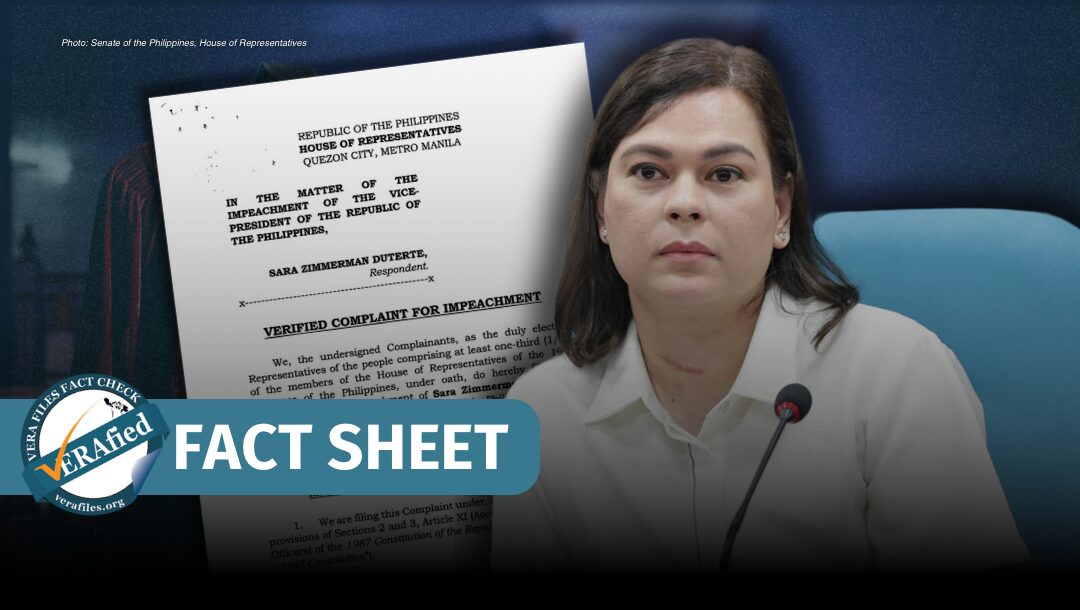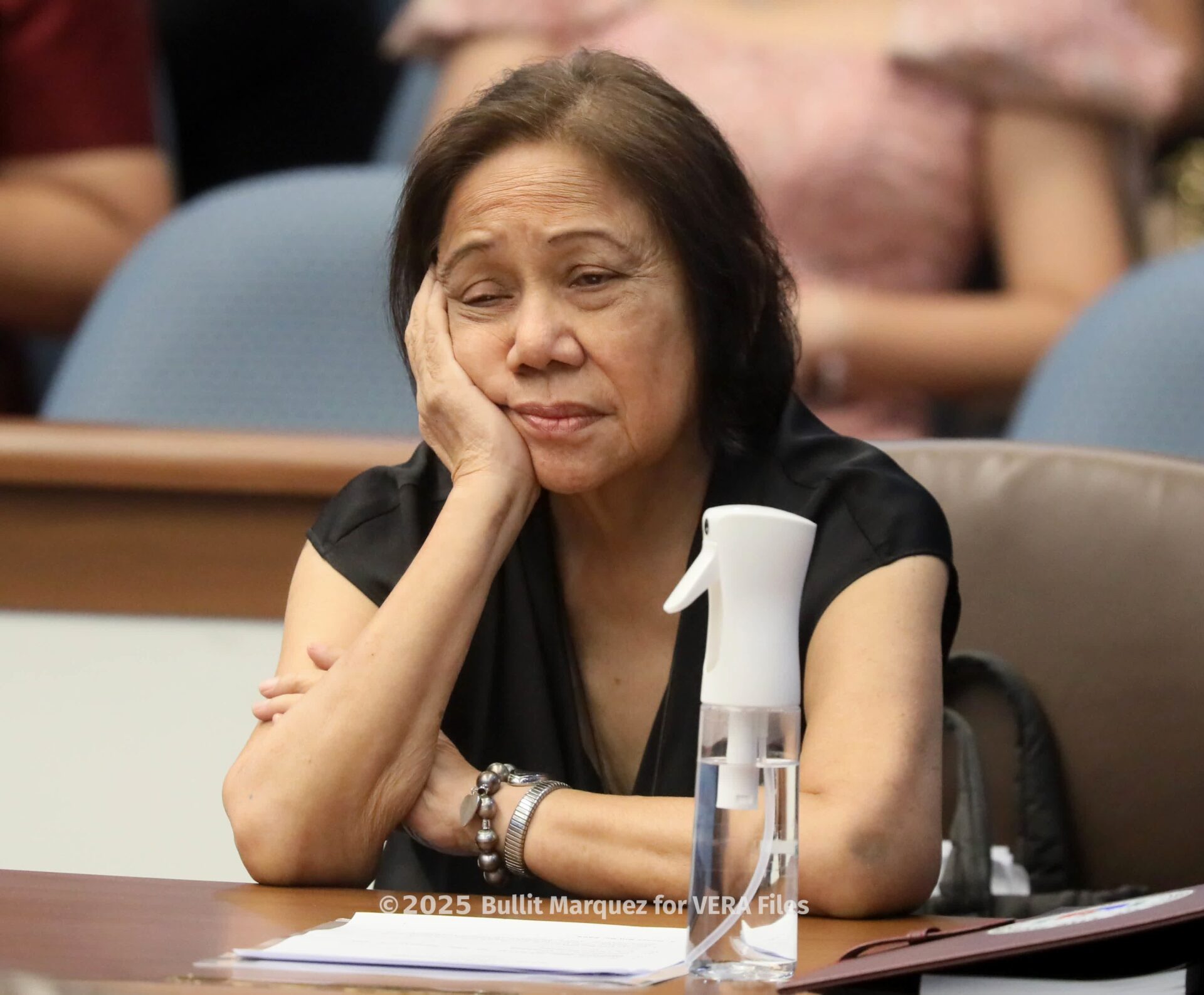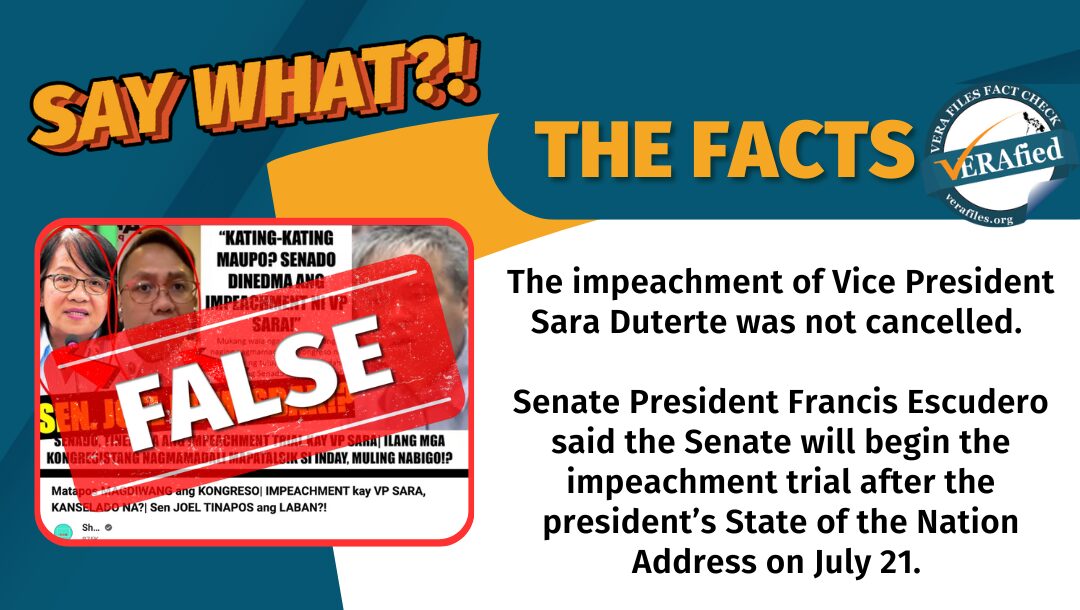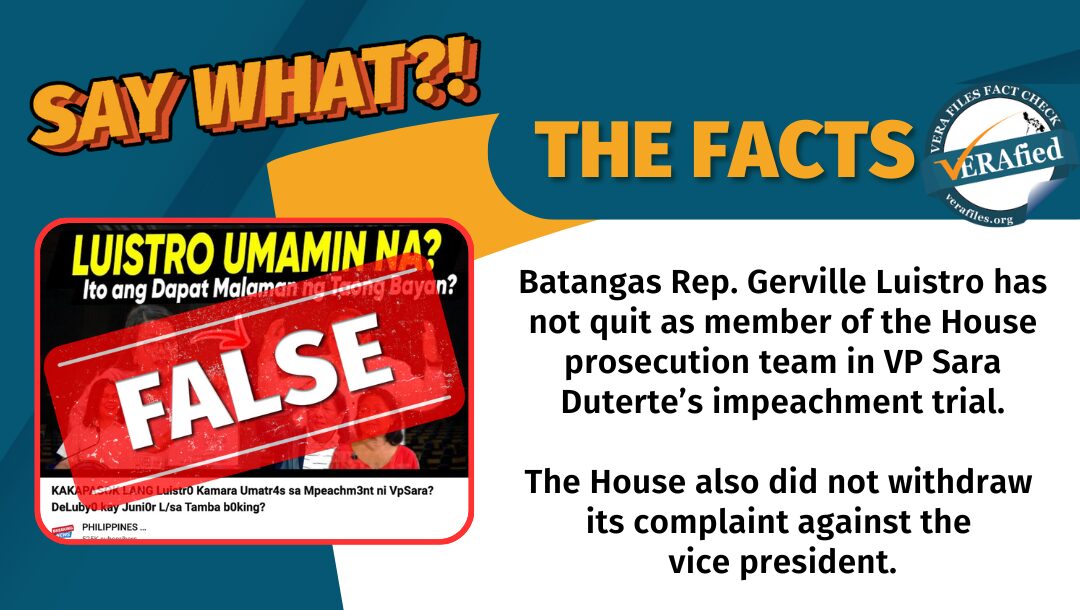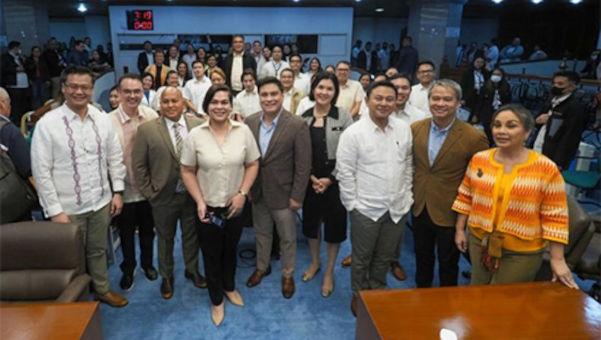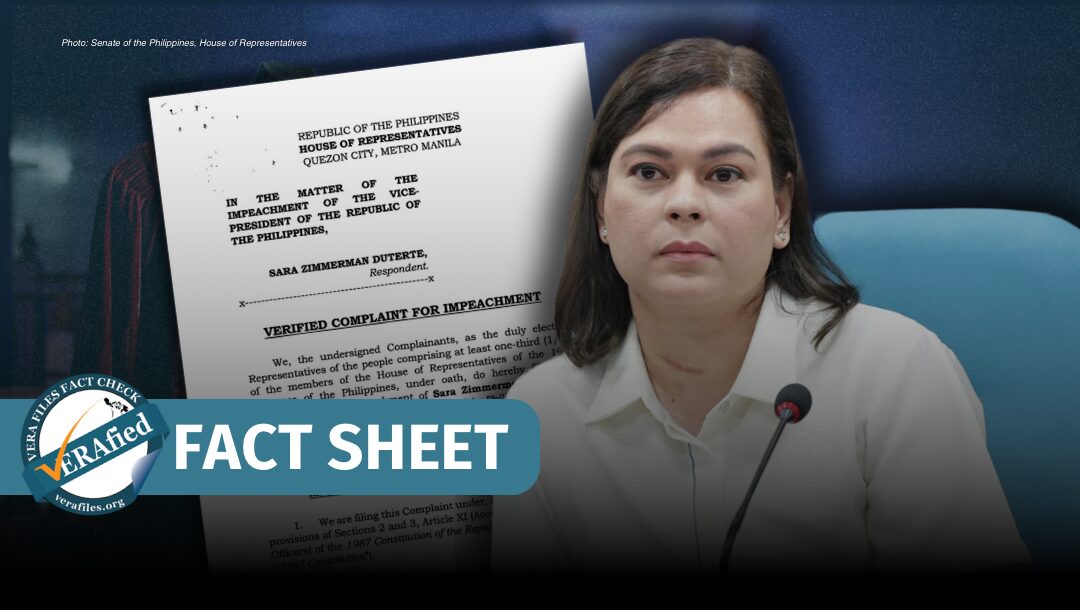
Section 3, Article 11 of the Constitution says: “In case the verified complaint or resolution of impeachment is filed by at least one-third of all the Members of the House, the same shall constitute the Articles of Impeachment, and trial by the Senate shall forthwith proceed.”
The House of Representatives impeached Vice President Sara Duterte on Feb. 5 with an overwhelming 215 out of 317 members endorsing the consolidated complaint. The complaint listed seven charges, including alleged misuse of P612.5 million confidential funds, plotting to assassinate President Ferdinand Marcos Jr., involvement in extrajudicial killings and incitement to insurrection and public disorder.
Sara Duterte is the first-ever Philippine vice president to be impeached and the fifth official to face an impeachment trial. The 19th Congress that impeached her is ending its term on June 30 but the Senate has yet to convene as an impeachment court to conduct the trial.
The question on whether or not the incoming 20th Congress—whose term begins at noon on June 30 but will convene as a legislative body on July 28—could continue the impeachment process remains unsettled.
Senate President Francis “Chiz” Escudero has been widely criticized for delaying the impeachment process.
He earlier set the trial to begin on July 30, over five months after the Articles of Impeachment were sent to the Senate by the House on Feb. 5, just a couple of hours before Congress adjourned for the campaign period for the May 12 midterm elections. Escudero then set the reading of the charges on June 2, only to move it to June 11, the last session day of the 19th Congress.
On June 4, rumors circulated in the Senate about an authorless resolution to dismiss the vice president’s impeachment even before the trial could begin. Sen. Ronald “Bato” Dela Rosa admitted that one draft came from his office while Sen. Imee Marcos said there were other versions.
With only three session days left before the 19th Congress adjourns sine die on June 13, what can we expect from the Senate in dispensing its constitutional duty to convene as an impeachment court?
VERA Files explains:
What do experts say on the impeachment trial crossing over to the 20th Congress?
Lawmakers, legal experts, academics and analysts have not been able to agree on this crucial question, which could spell the end of the impeachment trial or allow its continuation under a new set of senator-judges and prosecutors.
Escudero said the decision falls on the next Congress if it will continue the impeachment trial.
“Pwedeng pagbotohan ‘yun ng plenaryo ng 19th Congress, pero anuman ang desisyon namin, hindi pwede i-bind ‘yung 20th Congress,” he said at a June 2 press conference.
(The plenary of the 19th Congress can vote on it, but whatever our decision is, we cannot bind the 20th Congress.)
In the June 2 Senate plenary session, outgoing Majority Leader Francis Tolentino insisted that the chamber cannot carry unfinished proceedings into the next Congress.
“Jurisdiction over impeachment is exclusive to the Congress that receives the complaint… all legislative and investigatory matters terminate with expiration of the Congress,” he said.
But the Supreme Court ruled in 2004 that the non-legislative functions of Congress are not necessarily affected by the final adjournment of its regular sessions, in which only legislative functions are ceased.
Former Senate president Franklin Drilon agreed, saying on ANC’s Headstart on June 3 that the Senate is a continuing body with the impeachment court following a separate calendar.
This was echoed by Rene Sarmiento, one of the framers of the 1987 Constitution, who said in the June 3 episode of Christian Esguerra’s Facts First podcast, that impeachment proceedings should “proceed forthwith, tuloy-tuloy (continuously) until the mission is accomplished” despite adjournment or any suspension of session.
Citing Rule III of the Senate impeachment rules, outgoing Minority Leader Aquilino “Koko” Pimentel III noted the possibility of an extension into the next Congress.This provision states that the body “shall continue in session from day to day (except Saturdays, Sundays and nonworking holidays) until final judgment shall be rendered, and so much as longer may, in its judgment, be necessary.”
“The Senate in impeachment cases is more like a judicial body than a legislative one. Just like a court, the workload, case load or docket of the Senate as the impeachment court will not and should not be affected by a change in membership,” Pimentel said on June 2.
Senator-elect Vicente “Tito” Sotto III, a former president of the chamber, said on May 29 on ANC’s Headstart that the Senate terminates upon the expiration of Congress and the next set of lawmakers can decide how to go about the impeachment trial.
American impeachment rules, on which the Philippines based its own regulations, provide precedents of impeachment trials that were continued into the next Congress, wrote UP College of Law Assistant Professor Paolo Tamase.
In the June 2025 edition of the Philippine Law Journal, Tamase noted five instances, the latest of which was in 2009 when the impeachment trial of district judge G. Thomas Porteous was carried into the 111th Congress from the previous one.
How soon can the impeachment court convene and how long will the trial last?
“Once [the Articles of Impeachment are] presented in plenary, the Senate can already constitute itself as an impeachment court and conduct the trial of the vice president,” according to a May 29 Senate press release, quoting Escudero.
On June 2, he said the Senate will convene as an impeachment court on June 11, “barring any unforeseen circumstances [or] any procedural motions that will be made.”
The most recent Senate impeachment trial ended with a 23-3 vote to convict then Supreme Court chief justice Renato Corona in May 2012. The trial lasted over four months, from Jan. 16 to May 29, 2012.
The only other impeachment trial to have taken place in the Philippines, that of former president Joseph Estrada, lasted 23 days from Dec. 7, 2000 to Jan. 16, 2001. It ended when the prosecutors and 10 senators walked out of the plenary, triggering the second People Power which led Estrada to leave Malacañang.
Two other impeached officials—then ombudsman Merceditas Gutierrez and Comelec chairman Andres Bautista—resigned before trial could begin in 2011 and 2017, respectively.
What will happen when the impeachment court convenes?
The Senate convenes as an impeachment court, with the Senate president as the presiding officer. When the president of the Philippines is on trial, the Supreme Court chief justice presides while the senators act as judges.
Senator-judges are sworn to “political neutrality.”
In prior impeachment proceedings, the Articles of Impeachment are read by the court secretariat. This time, Escudero said, the House prosecution panel will do the reading.
The impeached official is then asked to plead to each charge. The official may answer directly or have a counsel plead on their behalf.
The court will either convict or acquit Duterte of any of the seven charges in the Articles of Impeachment.
Senator-judges will determine the verdict for each Article of Impeachment. A guilty vote on at least one charge is enough to convict Duterte.
If convicted, Duterte will be removed from her position and perpetually disqualified from holding public office. Even if she resigns while the trial is ongoing, the Senate will still vote on her disqualification from public office.
“Theoretically, a resignation does not mean automatically that the impeachment trial is academic, because there is still another hanging issue as to whether or not the official subject of the impeachment complaint is qualified to run for office. So, in my view, the impeachment trial can continue,” said Drilon.
The UP College of Law released a primer on the impeachment process where it explained that “proof beyond reasonable doubt is not required for conviction in an impeachment trial.” This also means that senator-judges are not obligated to follow a standard of proof in judging the evidence and arguments.
Though a conviction does not result in a criminal arrest, criminal and/or civil charges can be filed against Duterte separately. Prosecution after impeachment is not prohibited as it does not qualify as double jeopardy, or repeated trial for the same offense.
Who are the key figures involved in the trial?
Senator-judges in the impeachment trial will decide on the charges based on presented evidence and arguments.
Seventeen senators from the 19th Congress will retain their posts and continue to sit as judges should the trial be carried over to the 20th Congress. Seven new senators, either returning or neophytes, will also be judges if the trial extends.
Escudero will serve as presiding officer before the adjournment of the 19th Congress. If re-elected as Senate president in the next Congress, he will continue to preside over the trial.
The House prosecution panel is responsible for presenting evidence and arguing in defense of the Articles of Impeachment. The 11 prosecutors are elected by the House of Representatives among their own members.
Nine members of the prosecution panel were re-elected to their congressional posts.
General Santos City Rep. Loreto Acharon, who sought re-election, and Ako Bicol Party-list Rep. Raul Angelo Bongalon, who eyed to represent Albay’s first district, lost their respective races. They will be replaced by House newcomers Leila De Lima of the Mamamayang Liberal Party-list and Chel Diokno of Akbayan Party-list in the 11-person prosecution panel.
Iloilo Rep. Lorenz Defensor said on May 28 that not all prosecutors were required to attend the reading of the charges. Manila Rep. Joel Chua said Batangas Rep. Gerville Luistro has been chosen to do the reading of the charges at the Senate on June 11.
REVIEW: Why is VP Duterte on trial?
The House of Representatives filed seven Articles of Impeachment against Duterte, falling on the grounds of betrayal of public trust, as exhibited in the “graft, corruption and malversation of confidential funds” and “the totality of [her] conduct as vice president,” among other acts.
The House endorsed a consolidated impeachment complaint against the vice president on Feb. 5, resulting in her impeachment. The Articles of Impeachment were transmitted to the Senate without a plenary vote, since the number of verified signatures on the consolidated complaint were more than one-third of the House.
The complaints resulted from the House investigation into Duterte’s alleged misuse of P612.5 million in confidential funds for the Office of the Vice President and the Department of Education, as reported by the Commission on Audit in the public hearings on the 2025 budget proposals for her respective offices.
